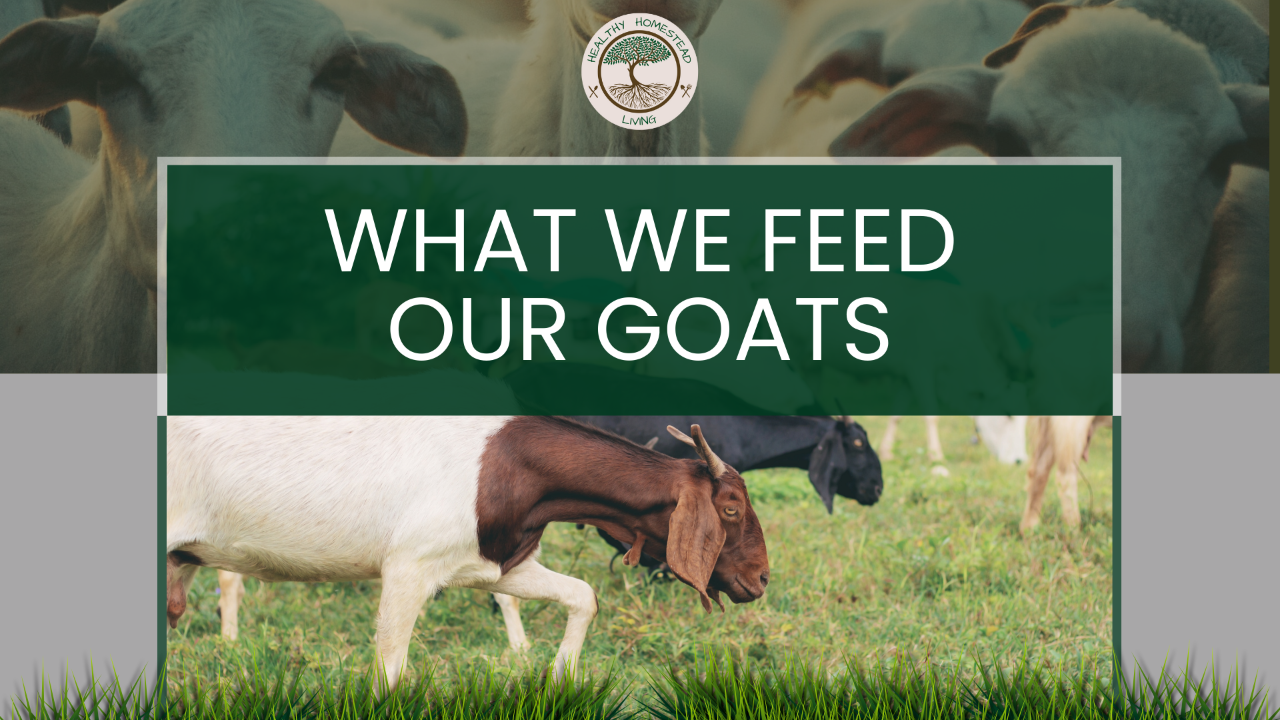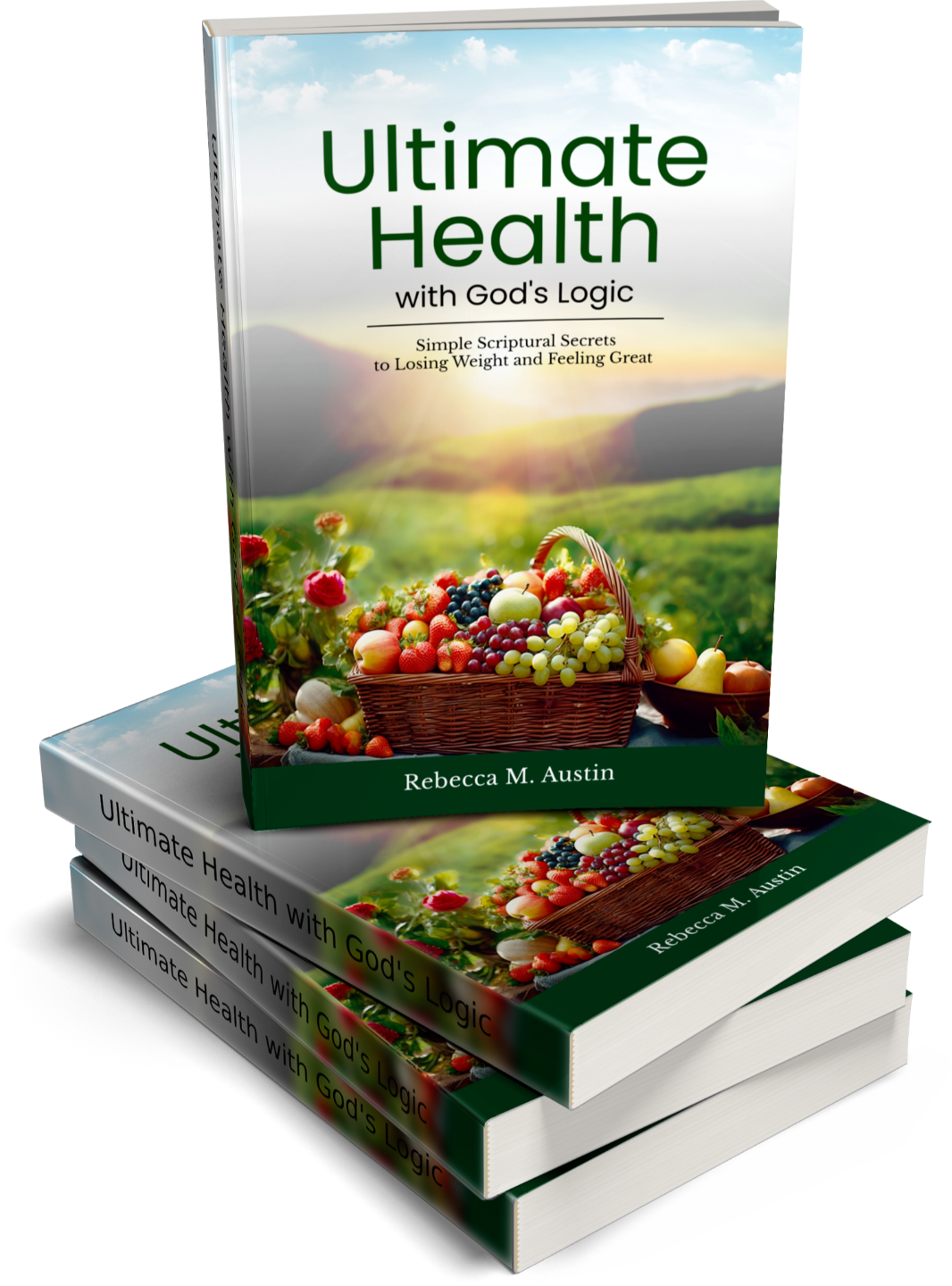What We Feed Our Goats

Once you make the decision to welcome an animal to your homestead, you take on the responsibility for the health and well-being of that animal. When it comes to care, there are three schools of thought; one: you can go with the modernized, traditional approach of commercial feeds and supplements, two: you can opt for a completely natural approach, and three: you can choose to create a program that combines the best of both worlds. What you choose depends on your personal circumstances, yet for me, we decided to go with option three. When raising goats for milk, we wanted to ensure that we had healthy animals who produced quality milk. At the same time, we needed a regimen that was economical and time efficient. The following is a brief outline of what we feed our goats.
Sprouted Whole Grains: Rather than choose to go with the traditional bagged feeds, we prefer to mix our own grain using whole grains which have been sprouted. Goats need a high protein content when producing milk and by mixing our grains, we offer them the most natural form of quality proteins easily assimilated into their systems. Sprouting the grains (which is impossible to do with any pelleted formula), does several things. First, it naturally breaks down the endosperm on the seed making the grain more easily digested. Second, it swells the seed, releasing the bioavailable nutrients of the seed, increasing the nutritional content of the grain. Third, also due to the swelling, volume is increased by up to 2.2 times which translates into twice the bang for your buck with the same quantities. So, for just about 5 minutes worth of extra work, you get better nutrient quality for less cost. Win-win, right? The formula we use to sprout is:
3 parts whole oats (12% protein), 2 parts whole organic barley (11% protein), 1 part whole organic wheat (10.8% protein), 1 part Black Oil Sunflower Seeds (13% protein)
Additional optional ingredients depending upon availability and cost: whole winter peas (sprouting seeds)(22% protein) and/or millet (12% protein)
To sprout, soak desired amount overnight (or for 12-24 hours) in water to completely cover the grain. Be sure to use a vessel or bucket that is at least twice as large as the quantity you are spouting as the seeds WILL swell considerably. After soaking, drain the water (but don’t discard this water! I offer it to my goats and chickens as an extra special treat. They will slurp it up enthusiastically.) The best way that I have found to drain is by using an old pillowcase, cheesecloth, or large scrap fabric. The pillowcase works best since it’s already shaped well to hold the grain. You can also use a large colander if you have one you don’t mind contributing to the animals. It generally takes about 3 days for the grain to sprout, so in that time, once or twice a day depending on necessity, dampen and drain your seeds again. You want to keep them moist but not wet. This is why I like the pillowcase the best. You can soak the pillowcase with the seeds in it, then leave it somewhere safe to hang and drain. As soon as you seed little nubs on the seeds, they’re ready. I like to make several days worth since it is still ok to feed the sprouted grains even after they have larger sprout “tails”. A word of caution, however, depending on your seed source, sprouts can mold easily. If you find your sprouts molding, try adding a little apple cider vinegar to the soaking water or use Anolyte.
My Feeding Schedule: Once I have my grains sprouted, the basic guidelines I use in feeding my goats is as follows:
Bucks, Whethers, Dry Does
The boys and the dry does generally get free choice hay, lots of fresh water, and free choice minerals. I have custom mineral feeders made from 4″ PVC pipe with elbows and lined up on a wall that doesn’t attract climbing. I have 4 different PVC mineral feeders in each pen, offering free choice kelp, nutritional yeast, baking soda, and commercial goat minerals like Sweetlix. Once a week, everyone gets a dose of herbal wormer to control parasites. During breeding season, the bucks get an additional 1-2 cups sprouted grains and Chaffhaye. All goats are monitored closely for changes in weight, appearance, eyelid color, and behavior which would signal a need for additional supplementation or feed.
Pregnant Does
When I first got back into raising goats, I was blessed with a beautiful Nubian doe who had been bred before I got her. I didn’t know much then and sort of let nature take its course. She was a smaller doe and I was so worried about overfeeding her and making the kids too large, further complicating the birth (yep, I really didn’t know much). As a result, I almost lost her. She had four beautiful and healthy babies that year, but after the delivery she was so weak, thin, and poor that she almost died. Thankfully I had the help of my goat mentor from Windsong Nubians who came to my rescue with major vitamin and mineral drenches, intense feeding schedules, and helped care for 2 of the babies so she didn’t have such a heavy milk burden on her weakened body. I learned alot that year and vowed never to make the same mistake again. After much research and discussions with successful breeders, I now feed the following to my preggo ladies starting 2-3 weeks before due date:
- 1 cup sprouts, slowly increasing to full ration by due date mixed with a handful of wheat bran and 1-2 Tblsp Apple Cider Vinegar
- 1 tsp Pregnancy Herbs mixed into grain twice daily (Red Raspberry, Nettle, & Squawvine)
- 1 Tblsp Vitalerbs also mixed into grain (see recipe in previous post)
- 1/2 Tblsp Comfry Root or Leaf mixed into grain
- about 1/2 # of Chaffhaye
- free choice grass hay (we use brome)
- pasture grazing
- herbal wormer weekly to prevent parasite infestation
As soon as they go into labor, I make an herbal tea of Fenugreek, Red Raspberry, Thyme, and Squawvine and let them drink at least a pint and repeat offering this tea to them every 2 hours until the kids are born. This formula will support the labor process naturally.
Milking Does
Producing milk is an incredibly strenuous process for the goats. They need to consume sufficient calories and proteins to support the demands making milk places on their bodies. I watch my does closely to catch any changes quickly and hopefully address them before they escalate. Prevention is always better than treatment. Lactating does are fed:
- 2 cups sprouted grains mixed with a handful of wheat bran and 1-2 Tblsp Apple Cider Vinegar fed while on the milking stand (twice daily)
- top dress with fresh carrots or carrot powder
- also top dress with Comfry Leaf and/or Flax Seeds
- if necessary (such as a doe with triplets or quads, or when boosted milk production is preferred like when on DHIR Milk Test) top dress grain with an herbal mixture that promotes lactation consisting of the following: Alfalfa, Anise Seed, Barley Grass, Blessed Thistle, Chaste Tree Berry, Dandelion Root, Dill, Fennel Seed, Fenugreek, Hops Flower, Marshmallow Root, Mullein, Nettle, Parsley, and Wheat Grass
- immediately after milking, each lactating doe gets about 1 Tblsp goat milk kefir mixed with a dash of garlic and a dash of cinnamon. I mix use an old Probios tube to offer this dosage to the doe. She loves the flavor and slurps it up happily. Kefir offers vital probiotic and prebiotic nutrients.
- free choice Vitalerbs, Kelp, Nutritional Yeast, Baking Soda, and Minerals in separate mineral feeders
- 1/2 – 1 # Chaffhaye
- free choice grass hay
- pasture grazing
- herbal wormer weekly to prevent parasite infestation
So far, we’ve had great success following this program. I’m always tweaking and looking at better ways to do things, especially when balancing quality and economics. As I mentioned before, I am not a vet, nutritionist, or herbalist…just an avid student with successful results. Be sure to consult a specialist if you have any concerns or questions prior to making any changes to your current feeding program. Thanks and Happy Homesteading!
Finally Achieve "Ultimate Health"

Ever feel confused by all the conflicting information out there on what is healthy and what is not? Low Fat vs. Fat, Low/No Carb vs. Carbs, Plant-based, Vegan, Vegetarian, and the list goes on and on. Why can the so-called experts never agree?
Introducing a new way of approaching healthy diets and healthy living...one that follows Biblical principles yet is also based on scientific studies that prove why God provided the guidance He did in Scripture. Get your copy of our latest release: "Ultimate Health with God's Logic: Simple Scriptural Secrets to Losing Weight and Feeling Great."
Take the 21-Day Healthy Habit Challenge!
Want to implement healthier habits but not sure what to do or where to start? Join our challenge!
Enroll for FREE by clicking the button below. Then, over the next 21 days, we'll be sending you a daily email for the next three weeks to guide you on creating healthier habits that will last a lifetime!
Adjusting your habits takes more than just action. For true transformation, you also need two other key things: a belief that you CAN, and a purpose... a WHY!
Take a moment to think about all the amazing reasons WHY you want to improve your habits for better health.
Get started today by clicking the link below.
We respect your privacy and will only send you content we feel is valuable for you. Unsubscribe at any time.

